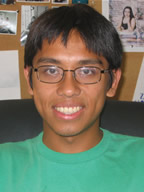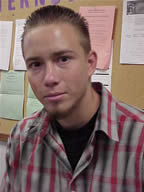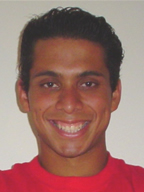Safe, Better Travel Is Topic
No. 1 for Fellowship Recipients
December 12, 2006
By Debra Cano Ramos
Three engineering students are delving into various transportation issues this fall, thanks to Dwight David Eisenhower Transportation Fellowships from the U.S. Department of Transportation.
David Tee Lee, Alex Ramirez and Francisco A. Zabala have received $15,000 fellowships for study and research in transportation. This is the first time Cal State Fullerton students applied for the prestigious fellowship with all three chosen for the fellowship.
“It’s obviously good for the students and the university,” said Sergio Guerra, director for the Center for Academic Support in Engineering and Computer Science. “Overall, what this means is that we’re helping to produce more engineers.”
The trio received Eisenhower Hispanic Serving Institutions (HSI) Fellowships, aimed at providing students attending HSIs with additional opportunities to enter careers in transportation. The fellowship program, established in 1992 and managed by the Federal Highway Administration’s National Highway Institute, has awarded about 2,000 fellowships — totaling more than $20 million — to recipients at more than 800 colleges and universities. Guerra said he expects about 10 CSUF students to apply for next year’s awards.
In addition to the fellowship funds, the CSUF recipients also will attend a national transportation conference Jan. 21-23 in Washington, D.C. Lee is among 12 fellowship students nationwide invited to make a special presentation on their research project, Guerra said.
Lee, a junior who is majoring in electrical engineering, is researching the effectiveness of the use of a “blind spot sensor.”
In metropolitan areas, such as Southern California, where daily traffic is gridlock, one of the ways to ensure optimum traffic flow is to prevent accidents, explained Lee. Many of these accidents are caused by the lack of ability or decision to check a vehicle’s “blind spot,” he said.
His research investigates the possible design and effectiveness of a “blind spot sensor.”
Ramirez, a senior who is studying civil engineering, is investigating ways to improve the carpool system. “The current carpool system needs urgent revising,” he said, especially in the Southern California region, “where the urban and suburban infrastructure has made the region a clog of automobiles in streets and freeways.”
The traffic problem, Ramirez added, is quickly becoming more serious every year as new homes and communities are being built farther away from the large cities. “Many families make the decision to move farther from their jobs simply because homes are more affordable. This creates longer drive times for more people and greater congestion on the freeways.”
Zabala, a senior majoring in electrical engineering and taking courses in applied mathematics,is delving into a new generation of “unmanned ground vehicles.”
His interest in this area peaked after the success of “The Great Robot Race” in October 2005, in which robotic cars raced across the Mojave Desert. In 2007, the race will extend the concept of the robot race to a city. The vehicles will execute missions in a complex urban environment with moving traffic, Zabala explained.
“These conditions introduce a higher degree of uncertainty into the system, which implies that the control system architecture must be enhanced greatly,” said Zabala, who also is conducting research at the California Institute of Technology in Pasadena.
Zabala is studying a new generation of sensor integration and trajectory optimization algorithms that will allow an unmanned ground vehicle to obey basic traffic laws.




 Produced by the Office of Public Affairs at California State University, Fullerton.
Produced by the Office of Public Affairs at California State University, Fullerton.